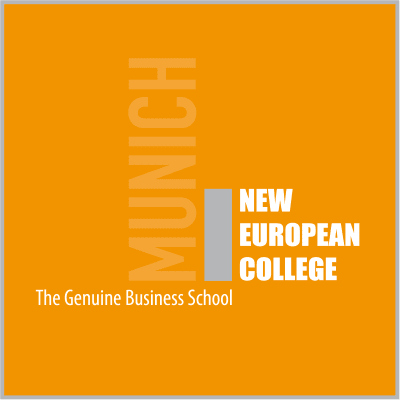
Master of Business Administration (MBA) Entrepreneurship & Innovation
New European College

Key Information
Campus location
Munich, Germany
Languages
English
Study format
On-Campus
Duration
3 semesters
Pace
Full time
Tuition fees
EUR 6,100 / per semester
Application deadline
01 Jul 2024*
Earliest start date
26 Aug 2024
* international students who do not live in the EU must apply 6-8 weeks before the entry date of choice. Students living in the EU must apply 2-4 weeks before the entry date of choice
Introduction
This exciting Master of Business Management program, specializing in Entrepreneurship & Innovation, challenges students to study at a high academic standard, combining case studies and research. However, the degree program also has a practical approach in its design – through project weeks, professional inquiry, and a module of professional-based learning in which students complete a short work placement often linked directly to their final project.
The program offers a combination of master of business administration subjects and broader modules in economics and management. Through modules looking at global economics and strategic management, globalization, society & culture, the program enables students to further develop their deeper knowledge of business management and administration.
Within the course, students gain balanced modules focused on entrepreneurship & innovation which enable a critical look at the role entrepreneurs have within society and the economy.
In a fast-changing world, where old ways of doing business and managing organizations have made way for new concepts, entrepreneurship & innovation specialized students will also consider aspects such as ‘Venture Capital & Private Equity’ and ‘Corporate Sustainability.’
Admissions
Curriculum
The school year at New European College is divided into two terms – Winter Term and Summer Term, and six main blocks, which last six weeks each. Each six-week block consists of two lesson weeks, followed by a project week, then two more lesson weeks, followed by an exam week, to complete the module.
Semester 1
(Core Modules)
- Marketing Management
- Globalization, Society & Culture
- Research Methods Introduction (Final Project)
- The World Economy
- Professional Inquiry
(Specialization Modules)
- International Corporate Sustainability
- Venture Capital & Private Equity
Semester 2
(Core Modules)
- Research Methods (Final Project)
- Micro Economics – Global Perspectives
- Strategic Management
- Project Module (3 Project Weeks, linked to Final Project)
(Specialisation Modules)
- Innovation, Creativity & Entrepreneurship
- Critical Perspectives on Entrepreneurship
Semester 3 (Work Placement & Graduation)
- Professional Based Learning
- Final Project
Gallery
Program Outcome
This exciting Master of Business Management program, specialized in Entrepreneurship & Innovation challenges students to study at a high academic standard, combining case studies and research. However, the degree program also has a practical approach in its design – through project weeks, professional inquiry, and a module of professional-based learning in which students complete a short work placement often linked directly to their final project.
The program offers a combination master of business administration subjects and broader modules in economics and management. Through modules looking at global economics and strategic management, globalization, society & culture, the program enables students to further develop their deeper knowledge of business management and administration.
Within the course, students gain balanced modules focused on entrepreneurship & innovation which enable a critical look at the role entrepreneurs have within society and the economy.
In a fast-changing world, where old ways of doing business and managing organizations have made way for new concepts, entrepreneurship & innovation specialized students will also consider aspects such as ‘Venture Capital & Private Equity’ and ‘Corporate Sustainability’.
Scholarships and Funding
As a private university, we do not currently offer scholarships. This decision is based on our self-funded model. However, we provide detailed information on financing options for your studies through a dedicated page on our website.
Program Tuition Fee
Career Opportunities
Graduating from a highly international institution such as New European College, which places high emphasis on a combination of academic research and professional exposure, means that the career prospects of graduates from the Master of Business Management, specialized in Entrepreneurship & Innovation, are multiple and global.
Graduates often aspire to continue their studies at the Ph.D. level and/or move directly into business. This often results from their work placement and their final project.
The possible professions of a graduate from the Master of Business Management specialized in Entrepreneurship & Innovation can occur in four inter-related sections with natural overlap:
The (Serial) Entrepreneur
This is seen as someone who is committed to starting businesses and companies from scratch and making them a success.
The Independent Self-Employed Business Person
This is seen as a person who directs and manages an SME. This could be the owner of a family-driven business or a business person who buys and takes over an existing business. This can also be an entrepreneur who has started a business through innovation and remains to direct and manage that company without selling or leaving to start a new venture.
The second in command in an SME
This extremely important entrepreneur is the most common non-executive entrepreneur in small businesses. An entrepreneur, as the number 2 in an SME is a vital position as it enables the company to develop in an innovative and goal-orientated manner, with a careful balance of risks and opportunities. This kind of Intrapreneur is someone who has had experience with business or project start-ups and project management and has now reached the moment where the experience and knowledge gained can be used to support another entrepreneur.
The Corporate ‘Intrapreneur’
This entrepreneurial role is becoming increasingly important within companies and organizations, as well as non-profit and governmental organizations, as they are forced to change, develop and innovate in the modern economy and business environment. Corporations require entrepreneurial business leaders who, alongside their leadership qualities, have a broad range of business skills and competencies and business administration knowledge.